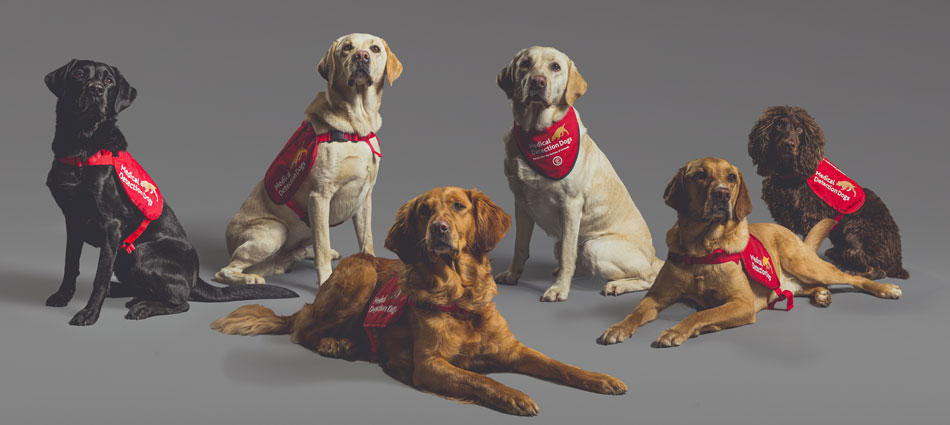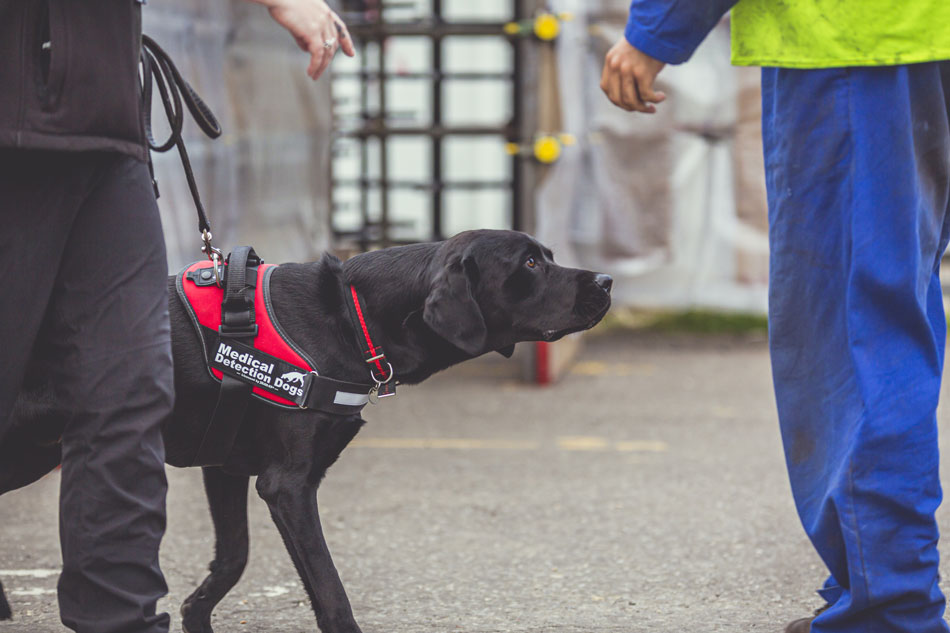COVID-19 Detection Dogs
In March 2020, Medical Detection Dogs started investigating whether dogs could play a role in preventing the spread of COVID-19.
In collaboration with The London School of Hygiene & Tropical Medicine (LSHTM) and Durham University, the team which successfully proved that dogs can be trained to detect malaria came back together to look at whether dogs could be intensively trained to detect the odour of the virus.

The aim was to prepare a team of dogs to help provide a rapid, non-invasive detection through screening individuals, including those who were pre-symptomatic, to highlight whether they need to be tested. As well as helping to reduce the spread of the virus this would make sure the limited NHS testing resources were only used where they were really needed.
Phase one of the trial was to comprehensively assess whether trained dogs could distinguish between the odour of samples collected from people infected with SARS-CoV-2 and those who are uninfected, in a randomised double-blind trial.
The dogs were trained by the team at Medical Detection Dogs to identify COVID-19 using body odour samples which were sent to the research team by members of the public and NHS staff, consisting of socks and t-shirts. The team at LSHTM collected and processed a total of 3,758 samples, and chose 325 positive and 675 negative samples for training and testing.
The dogs were trained over a number of weeks by introducing them to the odour samples from individuals that had tested positive for COVID-19, as well as control samples from people who had tested negative. Samples were presented to the dogs on a stand system and the dogs were rewarded for correctly indicating a positive sample, or for correctly ignoring a negative sample. It quickly became apparent that people infected with COVID-19 have a distinct odour that can be detected by trained dogs with a high degree of accuracy.
Six dogs were then taken forward to the double-blind trial where the dog, technician and dog trainer were not aware of which samples were positive or negative. This removes any risk of inadvertent bias or behavioural cue that the dog could pick up on to indicate the correct response.
The highest performing dogs in the trial detected the odour of the virus in the samples with up to 94.3% sensitivity and up to 92% specificity, as published in the Journal of Travel Medicine. This was a far greater accuracy than recommended by the World Health Organization for COVID-19 diagnostics, with the dogs consistently outperforming lateral flow tests (LFT) across sensitivities between 80-90%, which had an overall sensitivity of between 58-77%.
Once the robust, scientific evidence had been gathered to prove that dogs could detect the odour of the virus, we moved to investigating dogs’ ability to become a fast, accurate and non-invasive identifier of those individuals who should then go on to take a diagnostic LFT. Through passive searching, i.e. detecting the odour directly on people, it was shown in modelling provided by LSHTM that using dogs in this way as a pre-screen in scenarios with large numbers of people, could greatly reduce the time and cost involved in requiring each individual to take an LFT. We had hoped to take this model forward to public sector people screening (passive search) and worked hard to achieve the relevant data to validate dogs’ impact in this model.
Initial training showed that dogs could detect the odour of the virus directly on people but the success of the vaccination program rolled out in the UK meant that focus changed from prevention of infection from transmission to prevention of severe illness through vaccination. This greatly reduced the number of LFT and PCR tests being taken by the public and all government guidelines and provision for testing stopped.
In addition, it became apparent during the course of the pandemic that as the virus mutated and became more transmissible, but generally less life-threatening, the odour signature (when looking for the human response to the virus) became less detectable. This has been validated by other organisations from around the world carrying out similar research. The more deadly Delta variant being more detectable by dogs than the subsequent Omicron variants.
In light of the reduced need for an early screening method we halted training for passive people search for COVID-19 detection.
There is still a distinct case for a rapid search diagnostic directly on people and we believe the people transfer system would be most viable in the future. With all we have learned from this project to date we will be prepared for either future pandemics or the possibility that a further mutation of COVID-19 is either not responsive to the vaccination or is significantly more aggressive/deadly. We are also immediately translating our learnings from the passive search part of our COVID-19 project to train dogs to detect urinary tract infections (UTI) in a brand new project for 2024.

